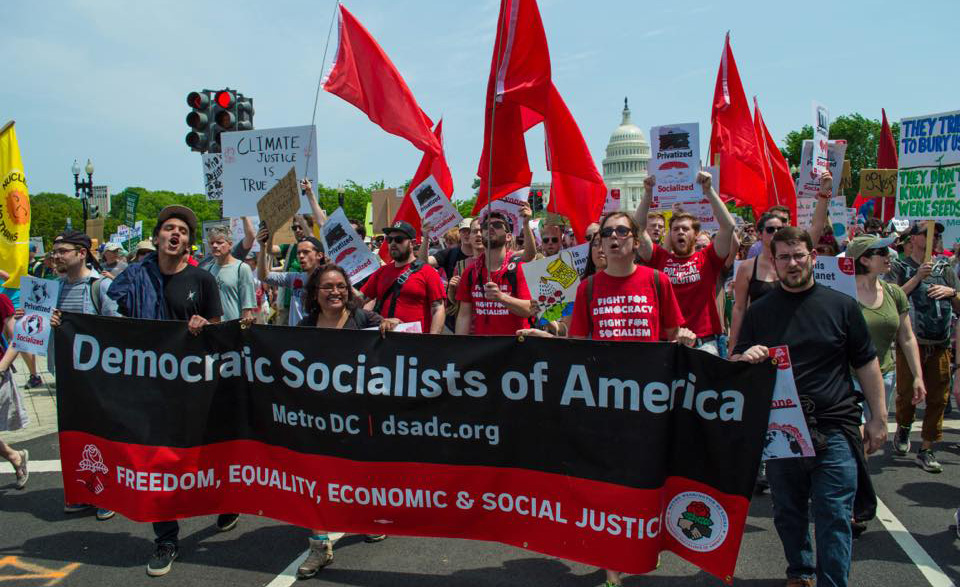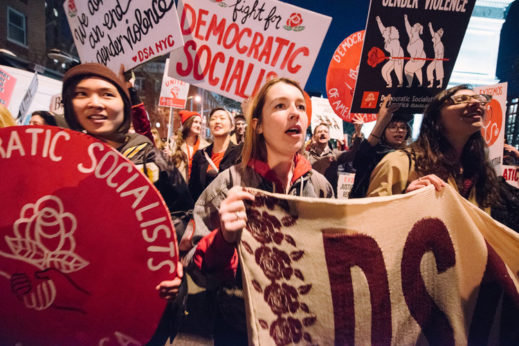
CHICAGO—A thousand delegates, alternates, and members from across the United States attended the biennial convention of the Democratic Socialists of America here last weekend. The gathering was described by Maria Svart, DSA’s national director, as “the biggest gathering of avowed socialists in a very long time.”
The organization’s membership tripled to 25,000 this year, largely on the heels of the Bernie Sanders presidential campaign. Sanders was unafraid to use the word “socialism” and proved that one could be a serious contender for even the highest office in the land if he or she embraced the word in the right way.
In a conversation on the sidelines of the convention, Svart explained that the construct of socialism being something bad falls apart when people see that socialists are people who fight for jobs for all, decent affordable housing, free college education, and single-payer health care for everyone in America. “This is what DSA and its members are doing,” she said.
In the resistance movement to Trump, DSA and its members have been out in the streets demonstrating—whether it was at the Women’s Marches the day after his inauguration or at the airports and courthouses when the president instituted his Muslim ban.
Part of the rapid growth of DSA results, according to Svart, from the organization’s refusal to give capitalism a pass. “We show that socialism means taking on and opposing income inequality, horrendous austerity, and all the other negative features of capitalism.”
Many people signed up with DSA this year because they saw joining as a way of continuing the “political revolution” embodied in the Sanders campaign of 2016.
Kristian Hernandez, the daughter of immigrants, heads up the North Texas chapter of DSA. She joined after the Democratic Party’s national convention in Philadelphia last July. “I started out as a Berniecrat,” she said, “and I saw first hand the mess that the Democratic Party could be when I was at the convention. I met DSA members and got turned onto the idea of being able to continue the fight after the convention.”
Hernandez said she had not yet read Karl Marx, but understood that “oppression can’t just be fought by theory alone, you have to get involved and do something.”
The pay-off of DSA’s participation in the Sanders campaign can be seen not just in its raw membership numbers, however, but also in the extensive network of new grassroots groups it now has around the nation. The organization now has 177 local chapters in 49 states and the District of Columbia.
More DSA members are also running for local office in various places across the U.S. Sometimes they run as Democrats, other times as independents. It was back in 1912 that Eugene Debs garnered almost a million votes when he ran for president of the on the Socialist Party ticket. DSA isn’t at the Debs level of support yet, but it’s gaining ground.
DSA’s growth is not entirely explained by the Sanders campaign, however. “Polls show that more than a third of American adults now say they prefer socialism to capitalism,” noted Joseph Schwartz, a member of the DSA’s National Political Committee. He said that among young people, aged 18 to 29, “the numbers are even higher, probably 50 percent.”
DSA members see support for socialist ideas in the broad public as another key factor in the tripling of their membership this year.
A third element, they say, is people’s desire to come out and fight against the policies of Trump. With Trump in office, “the times are perilous,” said Svart.
Other People’s World coverage of the DSA convention:
> Democratic Socialists of America hold convention in Chicago this weekend
> Growth of Democratic Socialists of America reflects growing rejection of capitalism
The members and leaders of DSA have a variety of perspectives regarding socialist strategy in the era of Trump.
Paul Prescod, a Philadelphia teacher and a member of DSA’s steering committee in his city, saw organizing and working in unions as the key. “Socialists are not going to really make headway unless there is a labor movement that is able to fully represent and fight for workers,” he said. “It’s a place to start.” He said socialists were already leading key labor battles across the country and pointed to the 2012 Chicago teacher’s strike as an example.
Jeremy Gong, another member of the National Political Committee, saw support for politicians like Bernie Sanders in the U.S. and Jeremy Corbyn, the leader of the Labour Party in the UK, as important. That type of support, coupled with backing of key legislation like the fight for Medicare for All in the U.S., he said, would help create more fertile ground for socialist ideas. “Fights for something like single-payer [health care] encourages workers to come together, have success, and to fight the bosses on other things. It’s a critically important fight.”
Ella Malony, a DSA leader from New York, said elections are “very important” but don’t tell the whole story. “Trump was elected but he has no mandate,” she explained. “Half the people stayed home and he lost the popular vote, so his support is smaller than it seems. The Democrats are also losing popular support. We [socialists] are gaining support but we are totally marginalized.”

Malony said that even “the election of democratic socialists is useful only to the extent that it politicizes and mobilizes people for action.” As a result, she said, DSA will be involved in elections in some areas and in other types of political campaigns in other areas.
Malony scored both Democrats and Republicans for being caught up in militarism. She said that calling for the transfer of huge amounts of money from the military budget toward human needs was another key battle for socialists. “When people support those cuts in military spending,” she said, “they are taking the first steps in an anti-imperialist direction.”
Schwartz, who is also an organizer of college professors, sees elections and organizing as both critical in the fight for socialist ideas.
“We have to change who is in office because Trump has power and obviously changing who is in Congress is a way to weaken that power.”
Schwartz sees campaigning for some progressive Democrats as part of that electoral strategy. “We need to back people like Mayor Lumumba in Jackson, Miss., and Ben Jealous or Nina Turner,” he said, ”but Democrats who are neoliberals are not people we want to support.”
“The struggle against racism has to be a central focus for us,” Schwartz said, “because even with the Bernie Sanders campaign, you always saw him pivot to class when questions of race were brought up. We are not going to have a united working class unless workers who are in minority groups feel that their special interests are being looked out for.”
“Racism is used to divide us,” Schwartz said. “We must fight against it and here in DSA we have to fight hard to improve the composition of our membership and leadership. A socialist organization must make the fight against racism a priority.”












Comments